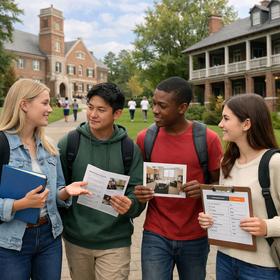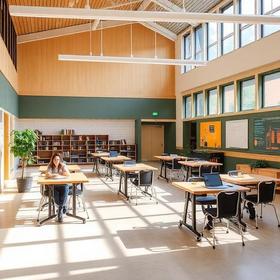I just read another one of those discouraging articles in the New York Times about the low esteem in which America holds its teachers in the 21st century. Author Sam Dillon is referring to public school teachers. This is a difficult time for most public school boards of education as they try to figure out what programs to reduce or eliminate to balance their budgets. Since local school districts are funded principally from taxes on real property, they cannot simply raise the mill rate. Historically, local residents will not pass budgets that have large tax increases. Inevitably, teaching positions are on the table. Teachers face salary and benefit cuts or, even worse, outright job losses. While I most certainly empathize with the teachers' predicament, I also know that private schools stand to reap the benefit of having some of these gifted professionals join their ranks. Besides being able to have a job in their chosen profession, why else would professional teachers want to teach in a boarding school? They would want to do so for many of the same reasons why you and I want our children to attend such residential schools. Let's look at some of the factors which might make an experienced public school teacher consider teaching in the private K-12 sector.
Academic Standards
Teachers want to teach. They love their subject. They know it inside and out at the level at which they have been teaching. They know all the tricks and ways to light our children's academic fires. Children are born curious. As they mature, we can nurture that curiosity or we can discourage it. Boarding schools typically encourage their students' love of discovery and learning. As I have said so many times, it's cool to be smart in a private school.
Teachers love to teach their subjects. They do not particularly enjoy teaching to a test. Teaching to a test is not something that most private school teachers have to do. Assessing their students' progress is something that private school teachers do class by class. Because the class sizes are small, private school teachers can see how their students are doing at a glance. Teaching 12-15 students is very manageable, as opposed to teaching 25-30 students.
Here is what Peddie School has to say about academics:
"Peddie has built its reputation on academic rigor, a friendly culture, and a focus on the whole student: mind, body, and spirit. Our academic program continues to transform itself and grow in meeting the demands of an ever-changing world. Pioneering the use of wireless technology and a discovery-based science program, the school has increasingly seen its mission as leading the future of American education. Over the last five years, we have increased our course offerings, particularly in the sciences, including new courses in forensics, DNA, neurobiology, robotics, physiology, evolution, genetics, quantitative chemical analysis, and organic chemistry. We have also added course offerings in arts, history, and mathematics. Recently, Peddie has embarked on a number of ambitious projects, including the expansion of the 16-year-old Chinese language curriculum into a world-class Asian Studies program. In preparing students for the world they will inherit, Peddie exposes them to languages and cultures that better position them to lead in an increasingly interdependent world. Thanks to our small class sizes and a wide variety of course options, students enjoy a unique opportunity to interact with each other and with their teachers. Our school provides an educational environment that is inclusive and supportive, what students need to succeed in the classroom and beyond." |
Learn more about academics at Peddie School, Hightstown, New Jersey.
Stretching Students
It sounds like medieval torture, but the stretching I am referring to is the gentle but persistent stretching of your child's mind. Expanding your child's horizons, exposing her to new ideas and new possibilities, while at the same time placing those ideas and possibilities within a historical context is what any good teacher does. That's what boarding schools do extremely well. The reason they can do that is that boarding schools are an authentic immersion experience. That's right. Your child is exposed to consistent shaping and nurturing twenty-four hours a day, seven days a week while she is at school. Each boarding school community sees that as an essential part of the overall boarding school experience.
This video offers an overview of St. John's Preparatory School, Collegeville, Minnesota.
Small classes play a major role in stretching young minds. Small classes encourage discussion and the thoughtful appraisal of ideas that each student offers. All of this is done under the skillful guidance of an experienced teacher who knows where the questions will lead and how the discussion will turn out even before her students have said a word.
Depth and Breadth of Coursework
In practical terms, mental stretching occurs within the structure of an academic curriculum which explores writings and concepts in depth. Your child won't read one sonnet. She will read dozens of them by different authors so that she understands the genre thoroughly. The same principle of exploration applies across the curriculum. As you evaluate boarding schools, review their academic curricula carefully and you will see what I mean. Most boarding schools offer extensive academic curricula. Take a look at some of the course offerings. Many of them rival and, in some cases, are better than many colleges when it comes to the depth and breadth of their academic courses. What makes the boarding school academic experience so superior is that most schools insist on having highly qualified, experienced teachers teaching those courses. Add to that the external examinations which take place in the senior year of most college preparatory boarding schools, and you have a quality 3-4 high school experience. Preparation for AP or IB diploma examinations is the norm at most boarding schools which use
Small classes which are a feature of most boarding schools make academic success possible. Small classes permit teachers to offer individual attention to each member of the class as needed. Small classes ensure that your child will not just be a number. She cannot hide in the back of the class in a small class. And, if the school uses the Harkness Method, she will be seated with her classmates around a large oval table facing her classmates. As I mentioned before, hiding in this class situation is impossible.
The following video from Shore Country Day School, in Beverley, Massachusetts, illustrates my point.
Small class sizes also ensure that teachers can teach rather than trying to manage a class of 35-40 teenagers. Large classes create time-consuming disciplinary issues which cut into teaching time. When you have small classes, you can teach children to think critically. You can encourage children to be all that they can be. The result is a high school graduate ready to take on some serious academic work at the tertiary level.
Why boarding school? It's all about standards.
Questions? Contac us on Facebook. @boardingschoolreview















